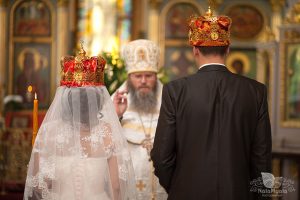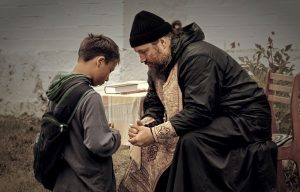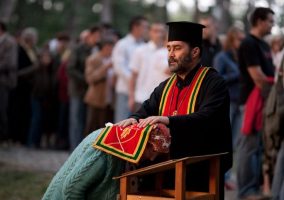Archpriest Nikolai Vedernikov, one of the most senior priests in Moscow, recently spoke with Pravmir about the meaning of spiritual fatherhood in the spiritual life. Born in Moscow in 1928, he was ordained to the diaconate in 1958 by Patriarch Alexy I and to the priesthood in 1961 by Archbishop (later Patriarch) Pimen. Having received an education in both theology and music, he is well known both as a preacher (in which role he shares many similarities with his close friend, Metropolitan Anthony of Sourozh) and as a composer of both church and classical music (in addition to a multitude of ecclesiastical pieces, he has also composed two symphonies). He serves at the Church of St. John the Warrior on Yakimanka Street in Moscow.

Archpriest Nikolai Vedernikov
Fr. Nikolai, is it necessary, in your opinion, for a Christian to have a spiritual father?
It is desirable to confess to a single priest. It goes without saying that it is the Lord Who accepts one’s confession and that the priest is only a witness. If one sincerely repents of one’s sins, then the Mystery is valid regardless of whether he knows the priest to whom he has confessed or how pious the priest is. But it is better if the priest knows the parishioner, when there is a real relationship of trust between them.
If someone takes his spiritual life seriously, he normally finds a priest with whom such a relationship can take shape – perhaps not immediately, but he will find one. This is very important for spiritual growth. When an unfamiliar person comes to me for confession, I always ask him whether he has a spiritual instructor. With the majority of people, it turns out that they do not, even if they have confessed before and have been going to church for years. This always saddens me. It is a pity that people who have been involved in church life for several years have not made the effort to find someone to instruct them in spiritual questions.
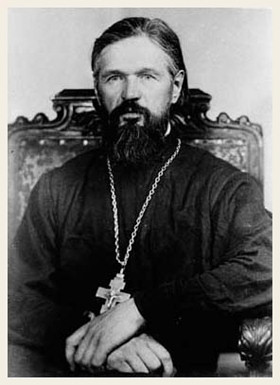
Archpriest Nikolai Golubtsov (+1963)
My wife and I have always been fortunate with spiritual fathers. Fr. Nikolai Golubtsov [1900-1963] blessed her to have children, although she has had hypertension since childhood and the doctors agreed unanimously that she should not give birth, that it would be life threatening. But three daughters have been born to us, one might say, with Fr. Nikolai’s blessing.
The relationship between a spiritual child and his spiritual father normally lasts until one of them dies. Fr. Nikolai died in 1963, after which our spiritual father was Fr. Vladimir Smirnov [1903-1981] from the Prophet Elias Church in Obydensky [Moscow]. After his death, it was Fr. Vasily Serebrennikov [1907-1996], a disciple of the Elders and a clairvoyant Batiushka. He advised writing one’s sins in a notebook daily. Not in detail, just: “I judged, I envied…” We strove to follow his advice. He was sick, for which reason we normally went to his house for confession, and not very often, but one just looked at one’s notes and did not have to try to remember anything.
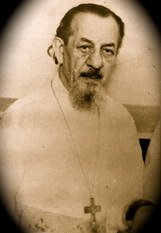
Archpriest Vladimir Smirnov (+1981)
Fr. Vasily lived for nearly ninety years, dying in 1996. Then the newly-departed Fr. Gerasim Ivanov [1918-2012] and I confessed to one another. He was a remarkable person, a talented artist, and a good shepherd; he was ten years my senior but, with all respect to him, I did not consider him to be my spiritual father. He was seriously ill in the final months before his death and did not serve.
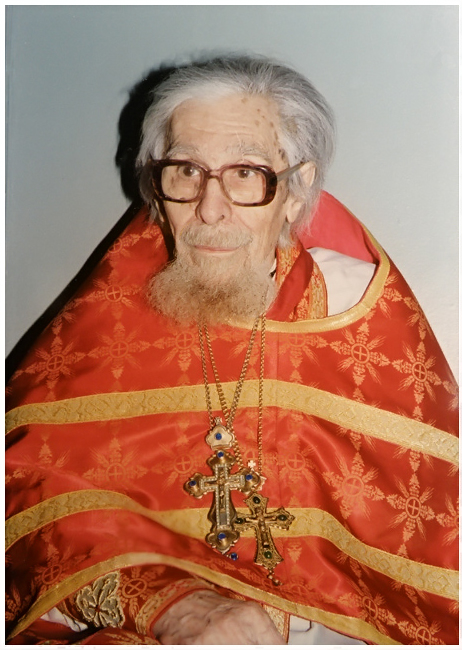
Archpriest Vasily Serebrennikov (+1996)
In the Church of St. John the Warrior on Yakimanka, where I now serve in a supernumerary capacity, there are many priests, so there is always someone to whom to confess. I trust them and feel that they treat their ministry in a responsible fashion, but so far I do not have a spiritual father. I hope that if, by God’s will, my life will continue (I am already eighty-four), that the Lord will send me a spiritual father. The Patriarch has a spiritual father, too, as do the other bishops. Everyone who takes his spiritual life seriously looks for a spiritual instructor.
For a priest, perhaps, this is truly necessary, since he has to counsel others.
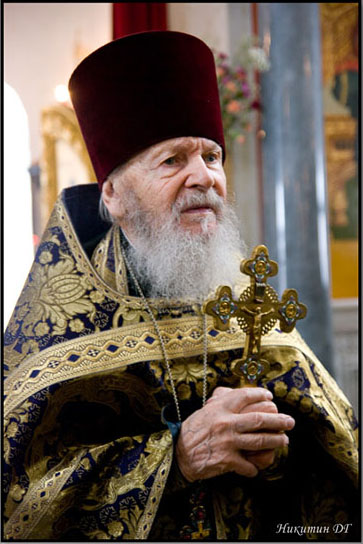
Archpriest Gerasim Ivanov (+2012)
This is necessary for everyone, because we are all sinners: for there is no man which sinneth not (2 Chronicles 6:36). You might not do anything wrong, you might behave yourself worthily in society and command respect, but there are thoughts to which you do not pay attention – and it is not without reason that in monasteries people repent of thoughts.
Over the course of the day, many different thoughts that are clearly sinful come into everyone’s heads. They come involuntarily, from the devil, who is seeking to instill in us greed, envy, condemnation, and other bad feelings. I try to banish these thoughts with the Jesus Prayer. Fr. Vasily generally recommended saying it constantly.
This short prayer – “Lord Jesus Christ, Son of God, have mercy on me, a sinner” – contains our entire Orthodox confession of faith; all dogma is built on it. If you say it attentively, then the Lord will gradually purify your inner world. But when thoughts overcome me, they pollute this world; and, even if I do not do anything bad to anyone, my polluted inner world will act upon my neighbors, on those with whom I interact, indeed on everyone around me. This is very important to remember: we are saved together. St. Seraphim of Sarov said: “Acquire the spirit of peace and thousands will be saved around you.”
We can attain purity of thought and amendment of our inner world if we follow the advice of the Apostle Paul: Rejoice evermore: pray without ceasing: in everything give thanks (1 Thessalonians 5:16-18). There is no reason to lose heart or to despair if Christ is with us. Therefore I recommend that everyone read at least one chapter of the Gospel daily. This is even more important than observing a prayer rule, because the Gospel is a letter from Christ Himself; it is through the Gospel that we come into contact with Him.
Some people think that the most important thing is putting up candles before icons and making full prostrations. But the most important thing in Christianity is our love for Christ, our encounter with Christ. The Lord values personal appeals: everyone can find a free minute (for instance, before sleep) and tell Him about what happened in his life today, about the difficulties that he faced, or ask for forgiveness and help – and the Lord will certainly respond. Perhaps not immediately, but He will respond. It is for this reason that I advise everyone to read a chapter from the Gospel daily.
The spiritual life requires guidance. A spiritual father is a priest who guides your spiritual life. He can be very simple, very unprepossessing, without any particular education – but if I trust him, that means that the Lord can say something very important to me through him.
How can a new parishioner understand that he can trust this priest, that the latter is trying to understand God’s will for us, and is not imposing his own will?
Indeed, some impose their own will in full confidence that God’s will has been revealed to them. A priest who has only just been ordained, who has neither experience nor knowledge, might fancy himself to be a spiritual guide. This is called “junior eldership” [mladostarchestvo], an unhealthy phenomenon that was very widespread in the nineties. It is going away now, but gradually.
Whether one can trust a priest enough to ask him to guide your spiritual life, only inner experience can tell. This is difficult, especially for someone who is just starting out in church life, but there is no other way. Such questions cannot be approached formally; I cannot give any general advice.
Priests themselves should probably not hurry to become spiritual fathers. I, for example, do not consider myself worthy to be a spiritual father. There are parishioners who regularly confess to me: there are perhaps ten to fifteen people who are accustomed to come to me. But when people ask me to become their spiritual father, as a rule I refuse. I am always ready to confess someone, to comfort him, to offer some kind of advice – but the relationship of a spiritual child with his spiritual father assumes obedience.
If a priest agrees to be my spiritual father, I believe that he will not simply give me human advice, but that the Lord will advise me through him and that I should show obedience. Whether I show obedience depends on my free choice. In the case of obedience to a spiritual father, the Lord grants His grace-filled help. But if I do not heed his advice, the spiritual father is not responsible. Without obedience, such relationships are meaningless.
Some parishioners heed my advice and strive to follow it, and this always pleases me, but I have never formally called myself someone’s spiritual father. I do not feel prepared for such responsibility.
Does obedience relate only to spiritual questions? Should a spiritual father give everyday advice, such as whether to change jobs or where to go on vacation?
An experienced spiritual father who knows his spiritual children well can also approach their everyday problems with understanding. For example, conflicts arise at work and people often immediately slam the door and leave. The changes that come next are not always for the better. When someone acts willfully, he often regrets it later. Conversely, if he does not immediately give in to his emotions, and heeds someone’s advice, then everything eventually returns to normal.
In such cases, I normally advise people not to rush, but to wait – time heals many things; many conflicts are resolved with time. Not only at work, but also in the family. A husband might be fooling around on the side. What should his wife do? The Church allows for divorce in such cases, but if she is prepared to be patient and forgiving, then their family life might be saved and return to normal. It does not necessarily happen this way, but I know of cases when it has. But divorce is always a tragedy.
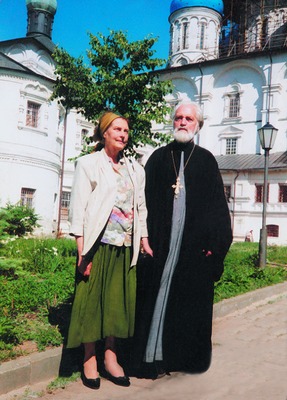
Archpriest Nikolai Vedernikov and his matushka, 1998
Incidentally, obedience is also necessary in family life – mutual obedience. Moreover, one cannot demand obedience of the other and not show it oneself. Say that your wife tells you something with which you do not agree. To contradict, to have things your way, to create conflict – this is wrong. One always needs to be able to listen.
Obedience [poslushanie] comes from the word “hearing” [slukh]; it begins with the ability to listen to what the other person is saying. We do not like to keep quiet. Our friend Metropolitan Anthony of Sourozh taught us: “We are all able to speak well, but we are not able to listen to one another. Therefore it is very important to listen attentively.” This is also very important in family life. The husband needs to be able to listen to his wife, and the wife to her husband, and all questions should be decided by discussion. Say your wife does not convince you – do not worry about it. Sometimes, for the sake of peace, it is better to agree with her. Peace in the family is more important than any of our ambitions.
With a spiritual father, the relationship is different: here I show obedience. But a priest can give the right advice – not from himself, but from God – only if he understands someone. And to understand him, he needs to listen to him attentively. And I, in turn, need to listen attentively to the words of my spiritual father in order to understand his advice.
Have there been occasions in your life when, after having asked advice of your spiritual father, it seemed to you that you did not have the strength to show obedience, that it was too burdensome for you?
No, I do not remember anything like this. But it did happen that I fell into a sin from which it was difficult to free myself. To do this, I needed both time and my spiritual father’s prayerful help. The priests to whom I confessed my sins always prayed for me and I felt their spiritual support, thanks to which I was able to get out from this condition and be freed from sin. This is a great thing: freedom from sin!
Dealing with oneself can be difficult. The most relentless enemy of the spiritual life is my selfishness, pride, and inability to exert myself. People follow different paths. We manage to overcome one sin, it goes away, but then something else appears in the soul. This requires a great deal of attention. It is here that a spiritual father can prompt one, sometimes even with tears.
I recall that, when I confessed my sins when I was young, the priest wept. It seems that his name was Fr. Benjamin. I approached him with real fear and trembling and he, listening to my confession, wept. He wept for my sins. Everyone has his own path, some more difficult and some easier, but in either case one needs to exert oneself. But we do not like it when we have to pass through the narrow gate. But seek ye first the kingdom of God (Matthew 6:33). It is within us.
If a spiritual father’s advice does not make sense, should one tell him this honestly and ask for clarification? Or should one accept it on faith?
I think that it is better to ask for clarification. Sometimes an explanation is enough, but sometimes time is needed for someone to understand advice that he is not yet ready to receive.
A priest should not pride himself in being exalted over his parishioners. Let us grant that he has more experience, just like a professor has more knowledge than his students. But when this experience is conveyed modestly then, willingly or unwillingly, you will listen and understand that you are not yet mature enough to understand this advice, that you are not ready to follow it, inasmuch as you are still inexperienced and immature in the spiritual life. When you understand this, it will be easier for you to humble yourself and still try to follow the advice.
One should not trust one’s own heart all the way. It goes without saying that one should listen to it, but one needs to maintain sobriety. The Apostle says: Be sober, be vigilant; because your adversary the devil, as a roaring lion, walketh about, seeking whom he may devour (1 Peter 5:8). The spiritual powers also operate through the human heart, for which reason spiritual control is necessary.
How much have parishioners changed during your fifty years of priestly ministry? There are clearly many more compared with the Soviet period, but some priests say that today the majority of people do not come to church with spiritual questions, but rather with psychological problems.
People come with various problems. But, in any case, you try to help remind them to give thought to what is most important. You talk to them about the meaning of life, about how death is always around the corner, and that one always needs to remember the hour of death. If we did indeed always remember death and that we must answer God, then we would stop sinning. But we do not remember this. We are so consumed by concern for our own wellbeing in this earthly life that the most important thing, that for which man lives, escapes our minds.
“Into Thy hands, O Lord Jesus Christ my God, I commit my spirit. Do Thou bless me, do Thou have mercy on me, and grant me life eternal. Amen.” This is what we pray before sleep. “Into Thy hands, O Lord,” because I do not know whether I will rise in the morning. Remembering this does not negate the joy of life. You can rejoice and interact with people, but all the while remember that you do not know how long you will live and give thanks to the Lord for every day of life.
I always advise people to ask the Lord in the morning that the day might pass without sin; and, at the end of the day, to thank Him for everything, both for what was good and for what was difficult. People usually do this.
Have there been examples in your own pastoral practice of repentance that was so deep that it confirmed you in faith?
Metropolitan Anthony of Sourozh told me about such repentance. A priest to whom he once confessed drank a great deal and suffered from an addiction to alcohol. Metropolitan Anthony said: “But at confession he wept not with drunk tears, but with tears for my sins.” It goes without saying that he did not name this priest, but that confession shook him like nothing else – and he was an experienced spiritual father who confessed thousands of people. I have never heard such a confession.
But you have confessed those sentenced to death.
Yes, but that was nearly twenty years ago and I have already forgotten the details. I only recall that these people repented sincerely. They were awaiting execution, but a moratorium on the death penalty was soon introduced and their execution was commuted to life imprisonment. Some of them still write letters from Mordovia to my daughter and turn to me with questions.
At first they all sought freedom, but I was against it. If they cannot bear it here, then they might slide and do something even worse than before. But there they have an established spiritual life and are visited by a priest. I do not consider them to be my spiritual children, but I pray for them daily – this is very important. And as long as they continue to write and to ask questions, that means that there is still some spiritual movement towards me.
As far as I understand, you feel that a priest should not seek to become a spiritual father?
Yes, they should not. I advise young priests above all to find a spiritual father for themselves. This is not an exhortation, but advice for an elder comrade. Without the experience of obedience, it seems to me, it will be difficult to instruct others in the spiritual life.
I myself did not seek to become a spiritual guide but, as I have already stated, there are maybe fifteen people who are accustomed to come to me and who regularly confess to me. Our interaction is not limited to confession in church. On Mondays, when possible, they come to my home. We talk about the Sunday Gospel reading, people share problems, and we make sense of them all through the Gospel, through Christ, and then we drink tea. I see that meeting one another and being able to share experiences makes many people happy. And I am happy that I am somehow able to help people.
Interview conducted by Leonid Vinogradov












